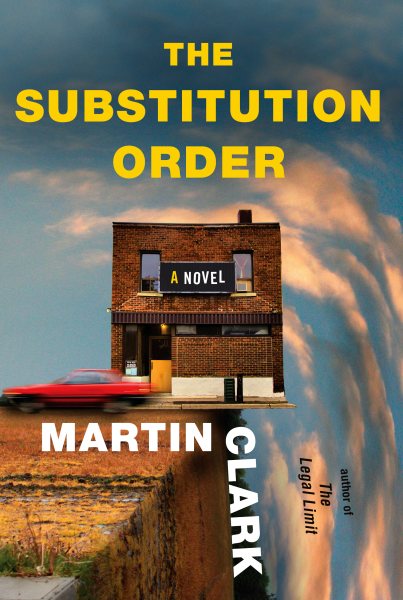Interview by Jana Hoops. Special to the Clarion-Ledger Sunday print edition (July 28)
Devoting decades to his life to the rough-and-tumble field of law has been pure inspiration for the fictional stories that have made Martin Clark one of the most awarded and acclaimed legal thriller writers today.
 The latest evidence of that claim: The Substitution Order, Clark’s newest novel, crafting a tale that embraces, at times, despair, hope, and unanswered questions about a lawyer who’s hit rock bottom after an unrestrained summer of bad choices leaves him broke and broken-hearted.
The latest evidence of that claim: The Substitution Order, Clark’s newest novel, crafting a tale that embraces, at times, despair, hope, and unanswered questions about a lawyer who’s hit rock bottom after an unrestrained summer of bad choices leaves him broke and broken-hearted.
Martin is a retired Virginia circuit court judge of 27 years whose previous novels (The Jezebel Remedy, The Legal Limit, Plain Heathen Mischief, and The Many Aspects of Mobile Home Living) have garnered awards including a New York Times Notable Book, A Washington Post Book World Best Book of the Year, a Bookmark Magazine Book of the Year, a Boston Globe Book of the Year, a winner of the Library of Virginia’s People’s Choice Award in both 2009 and 2016, and many more.
He and his wife Deana, a photographer, live on a Virginia farm with dogs, cats, chickens, and three donkeys.
After graduating from law school 35 years ago and going on to serve as a Virginia circuit court judge for 27 of those years, the law–and writing novels with law-related stories–must have become somewhat second nature for you. Your first book, The Many Aspects of Mobile Home Living, was published in 2000, followed by three others and now The Substitution Order. All have garnered much attention. Has it surprised you that your books were immediately met with such success, which continues today?

Martin Clark
I probably shouldn’t admit this–your version sure makes for a better history–but my books were definitely not “immediately met with success.” Like so many other writers, I collected years and years of rejection letters, until 1999, when Knopf took a chance on The Many Aspects of Mobile Home Living. To this day, at every gig I do, I read from those rejection letters. Here’s a favorite riff from a 1983 butt-kicking, sent to me by a New York literary agent: “I read five pages and wondered if you’ve ever been scared by a performing flea; read 10 more and developed a severe case of vertigo.” That said, I’ve had an excellent run since then, and I’m very grateful for my good fortune, which is, all things given, pretty darn surprising.
Your works carry a dry sense of humor that is built into the twists of the plots and the personalities of the characters. Have you found that to be one of the most appealing aspects of writing–does it come naturally to you?
Pretty much. Plus, there’s so much sadness and heartbreak in the court system that occasional levity helps all of us get through the days. Eighty percent of my job as a judge was sentencing people for theft, drug charges, and probation violations–a smile or a wry comment or quiet joke often made some weeks just a tiny bit more tolerable.
In The Substitution Order, you place a likeable, down-and-out attorney in the position of combatting scam artists trying to undo his career for good, even as he struggles to win it back by playing by the rules. His journey plays out amidst health issues, relationship foibles, and legal loopholes. How do you go about developing characters and their circumstances, and do you tend to base the substance of your plots on what you’ve seen during years of law and court experience?
I absolutely draw on my time in the courtroom–write what you know, correct? But the characters and the plots are largely fictionalized, given that much of what happens in court is frequently mundane and routine. More to the point, if, as a reader, you invest in a book, you don’t want a legal primer, you want a good ride, some entertainment, some twists and turns, and maybe a very small instruction at the end. And, to be clear, in The Substitution Order, Kevin Moore certainly knows the rules and how to use them, but I wouldn’t say he follows them to the letter.
The end of The Substitution Order was a bittersweet surprise. Is that in sync with your experience of handling legal cases that may not have turned out as you expected?
Thank you for mentioning that. As writers, we hope to tell a realistic, entertaining story, create likeable characters that readers will root for, and then provide a payoff over the last few pages. “Bittersweet surprises” is a great way to put it and exactly what I hope The Substitution Order delivers. As for handling court cases and how I’ve seen them turn out, virtually any lawyer will tell you that you just never know. Plus, as I highlight in the book, sometimes it’s a victory for a litigant when things don’t go totally and completely sideways, and you sneak out with minor wounds and not a full-blown bloodletting.
What have you enjoyed most about creating these stories, and what would you say is your biggest challenge when writing?
My biggest writing challenge these days is finding the stamina and focus to slog through all the technical, picayune final edits. I love writing, but debating commas and preferred spellings and capitalization rules is tedious. Necessary, but tedious.
You can check behind me, and you’ll discover I’ve never said anything like this before–I generally don’t care to praise my own writing–but The Substitution Order is by far the best novel I’ve ever put on paper. On December 30, 2015, I almost died, and it took me about a year to fully recover. I was lucky enough to have a steadfast wife and a godsend, genius surgeon, and now I’m fixed, totally normal. So, truthfully, I enjoyed simply being able to sit down and write this novel, being able to do it. Brushing against ruin tends to make you slightly wiser and a little more thoughtful. As my editor told me about this book: “You’ve always had a great story to tell, but now you actually have something worthwhile to say.”
Martin Clark will be at Lemuria on Thursday, August 15, at 5:00 p.m. to sign and discuss The Substitution Order.


Comments are closed.